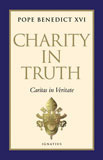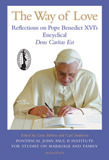Carl E. Olson's Blog, page 262
November 23, 2011
Save 20% on select titles in preparation for Advent

Preparing for Advent with 20% off select titles
Offer ends Tuesday, November 29th, 2011 at 12:00 midnight EST. These prices are available online only through Ignatius.com
Country Music Superstar Collin Raye Gives his Conversion Story on EWTN!
Tune in to EWTN for His Inspiring Story and Get Raye's New CD here!
The death of his 10 year old granddaughter in 2010 literally knocked Collin Raye to his knees, and challenged his faith like never before! Don't miss his story Thursday/ Thanksgiving Night on worldwide Television on EWTN at 8:00pm Est. Raye, who scored 16 #1 hits in country music, tells his story of conversion, the loss of Haley, and why he finally recorded a religious/ inspirational CD, His Love Remains. This is one for the entire family Thanksgiving night, his story, his incredible performance of Give Me Jesus and more.
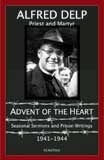 Advent of the Heart
Advent of the Heart
Seasonal Sermons and Prison Writings - 1941-1944
Alfred Delp
Fr. Alfred Delp,S.J., was a heroic German Jesuit priest who was imprisoned and martyred by the Nazis in a Nazi death camp in 1945. His approach to Advent, the season that prepares us for Christmas, is what Fr. Delp called an "Advent of the heart." More than just preparing us for Christmas, it is a spiritual program, a way of life. He proclaimed that our personal, social and historical circumstances, even suffering, offer us entry into the true Advent, our personal journey toward a meeting and dialogue with God. Indeed, his own life, and great sufferings, illustrated the true Advent he preached and wrote about.
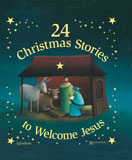 24 Christmas Stories to Welcome Jesus
24 Christmas Stories to Welcome Jesus
The joy and hope of Christmas are at the heart of this book intended for the whole family. Starting with the 1st of December (like an Advent calendar) each day has a new story, leading up to Christmas. Richly illustrated, this collection includes stories based on the Gospel accounts of the birth of Christ, as well as stories about Advent and Christmas customs. Also presented are original tales about living the Christmas message.
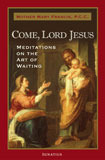 Come, Lord Jesus
Come, Lord Jesus
Meditations on the Art of Waiting
Mother Mary Francis
These Advent reflections by the abbess of a Poor Clare monastery, an accomplished spiritual writer, focus our attention on the coming of Jesus into our lives. There is a double movement to this coming; both our active preparation to be ready for him and our patient waiting for the Lord to arrive in his own good time. There is also an art to this simultaneous preparation and waiting, and no one knows better than the beloved Mother Mary Francis how to encourage us in our attempts to master this art.
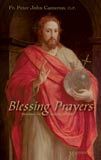 Blessing Prayers
Blessing Prayers
Devotions for Growing in Faith
Fr. Peter Cameron
When you are looking for reassurance of God's love in your life, but can't find the words to fit your need, Blessing Prayers is an ideal guide!
 Praying with Saint Mark's Gospel
Praying with Saint Mark's Gospel
Daily Reflections on the Gospel of St. Mark
Fr. Peter Cameron
Delve deeply into Mark's Gospel, which is read during the liturgical year 2011-2012. Edited by Magnificat's Fr. Peter Cameron, O.P., this book is a clear-cut and effective way to meditate daily on Saint Mark's Gospel.
A Pop-Up Advent Calendar with Booklet
Maite Roche
This brightly illustrated Advent calendar changes day by day into a multi-dimensional Nativity scene. Beginning the first of December and continuing through the big feasts of the Christmas Season,  children can open a window each day to reveal a new detail or a new character of the Nativity scene. A small booklet accompanies the calendar, providing the family with instructions, Scripture quotes, meditations and prayers. On each page is something to inspire all the members of the family.
children can open a window each day to reveal a new detail or a new character of the Nativity scene. A small booklet accompanies the calendar, providing the family with instructions, Scripture quotes, meditations and prayers. On each page is something to inspire all the members of the family.
Advent, Christmas, and Epiphany in the Domestic Church
Peter & Catherine Fournier
This is an illustrated book of wonderful activities for children and families to better 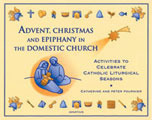 understand and celebrate the Advent, Christmas and Epiphany seasons. A large size, spiral bound volume, this is perfect for families to learn together and share the joys of this happy time of the liturgical year.
understand and celebrate the Advent, Christmas and Epiphany seasons. A large size, spiral bound volume, this is perfect for families to learn together and share the joys of this happy time of the liturgical year.
Anima Christi
Mother Mary Francis
These meditations on the famous prayer of St. Ignatius by a Poor Clare nun and well-regarded spiritual writer will help every reader deepen his prayer life and draw closer to the Person of Christ.
Deep Conversion/Deep Prayer
Fr. Thomas Dubay
In this book, Fr. Dubay responds to the call to priests by both Pope John Paul II and Benedict XVI to help believers and all those interested in spirituality to develop a deeper prayer life and union with God.
Prayer Primer
Igniting A Fire Within
Fr. Thomas Dubay
Fr. Thomas Dubay, a renowned teacher and writer on prayer and the spiritual life, presents a simple, profound and practical book on the most important of all human activities, communion with God.
Prayer For Beginners
Peter Kreeft
In short, straight-forward and unsentimental chapters, Kreeft covers all the key areas for understanding and developing that intimate form of communication with our Creator that we call prayer. He covers such areas as the necessity of prayer, various motives and methods, steps, patience, suffering, sin, faith, and grace.
Into Your Hands, Father
Abandoning Ourselves to the God Who Loves Us
Fr. Wilfrid Stinissen
In the spiritual life, we need a central idea: something so basic and comprehensive that it encompasses everything else. According to Carmelite Father Wilfrid Stinissen, surrender to God, abandonment to the One who loves us completely, is that central reality. The life of Jesus shows us the centrality of abandonment, for it is truly the beginning and the end of his mission on earth.
Five Pillars of the Spiritual Life
A Practical Guide to Prayer for Active People
Fr. Robert Spitzer
Fr. Spitzer presents a practical, yet rich guide for helping busy people develop a regular and deeper prayer life. This brilliant Jesuit priest presents five essential means through which the contemplative and active aspects of our lives can be fused together for a stronger spiritual life.
Mass Revision
How the Liturgy is Changing and What it Means for You
Jimmy Akin
The Mass is changing-How? Why? And what does it mean for you? Catholics all across America will be asking these questions, seeking the answers from a trusted source. In this highly readable, information-packed volume, award-winning author Jimmy Akin describes the transformation and lays out the facts.
A Biblical Walk Through the Mass
Edward Sri
Dr. Edward Sri takes us on a unique tour of the Liturgy. Based on the revised translation of the Mass which goes into effect Advent, 2011, this book explores the biblical roots of the words and gestures we experience in the Liturgy and explains their profound significance.
We Celebrate the Sacrifice of Love (The Mass) 2nd Ed
This practical Mass booklet is a wonderful tool to introduce the responses of the new translation of the Roman Missal to young children while explaining the parts of the Mass. Perfect for classroom or home instruction, this booklet displays the text of the Mass in the right hand pages with age appropriate explanations on the left.
Deacon rich, Deacon poor: Deacons in the Church in the U.S.
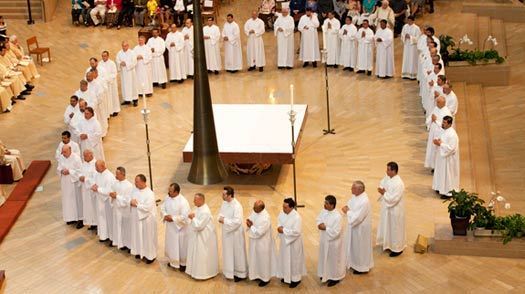
In 1967, Pope Paul VI issued general norms for the restoration of the permanent diaconate where requested by episcopal conferences. More than four decades later, 46 percent of the Church's permanent deacons serve in the United States. Today there are more permanent deacons in the Archdiocese of Chicago than in all of Africa and Asia combined.
At Catholic World Report, Jeff Ziegler takes a look at the permanent diaconate and how it affects the life of the Church in the United States, from major cities to rural communities. Deacons serve the poor and needy, participate in religious formation at all levels, and bring comfort to the sick and imprisoned. They also help make the sacraments more widely available, particularly in areas that may be experiencing priest shortages—although those are not the only areas that have seen an uptick in ordinations to the diaconate in recent years, as Ziegler explains.
Click here to read his full report, "Servants of the Lord," at Catholic World Report.
For Additional Sale Items Click HERE!
November 22, 2011
Speaking of things that cannot be spoofed...
... how about this video, which is apparently (or allegedly) an officially-sanctioned video of the International Association of Scientologists (IAS):
Um. Hmmm. Okay. The lyrics aren't exactly Shakespeare (or even Hubbard, for that matter), but at least they aren't about shooting cops or leering at, um, ladies. Still, they do have a certain creepy, cultish quality to them:
Giving solutions to the world and the whole human race
We ain't never gonna back down, leave town, play the clown.
Phychiatry and SPs you know we take 'em down.
See the purpose ingrained.
It's burning in our blood.
They the passing storm.
We the unstoppable flood.
See, cuz we the IAS.
And we're dauntless and defiant.
We confront even the giants, yo.
Handle anyone barring freedom for all.
Cuz you know when we win then nobody falls.
So bring it harder y'all.
Let's make it stronger now.
Unite as one, answer the call.
Come on, and we'll forever be the winners!
"SP" refers to a "suppressive person", and is part of the special language invented and implemented by L. Ron Hubbard. As journalist Janet Reitman explains in detail in her fascinating book, Inside Scientology, Hubbard used his alternative language as a way of further insulating his followers from outside influences, something he worked at with a frenetic passion for decades, notably from the 1950s through the 1970s. Hubbard had a special disdain for psychiatry and psychiatrists:
Hubbard also began to obsess over the forces he saw opposing him, including journalists, whom Hubbard long distrusted and even banned from ever becoming Scientologists. Worse still were psychiatrists, a group that, coupled with the pharmaceutical-drug industry — in Hubbard's words, a "front group" — operated "straight out of the terrorist textbooks," as he wrote in a 1969 essay titled "Today's Terrorism." He accused psychiatrists of kidnapping, torturing and murdering with impunity. "A psychiatrist," he wrote, "kills a young girl for sexual kicks, murders a dozen patients with an ice pick, castrates a hundred men." (from this excerpt from the book)
I've read about half of Reitman's book and, frankly, some of what Reitman describes is simply creepy and downright disturbing. I doubt that the above video, if really made by Scientologists, is going to help change that perception too much, even if it also inspires a few laughs along the way.
Why is it so hard to spoof the heresy and dissent of Priestettes and Co.?
Because when it comes to farce, cluelessness, arrogance, and downright nuttiness, it's nigh on impossible to satirize this sort of "reality", presented by the National "Catholic" Reporter:
Editor's Note: The following is the homily preached Nov. 19 by Janice Sevre-Duszynska, ordained a priest in the Association of Roman Catholic Women Priests. She and Franciscan Fr. Jerry Zawada led an inclusive Catholic eucharistic liturgy at the SOA Watch Vigil at Ft. Benning in Columbus, Ga., as part of the Progressive Catholic Coalition. Zawada and Sevre-Duszynska have both served jail time for civil disobedience to protest nuclear weapons and militarism.
First Reading: "Comfort the afflicted and afflict the comfortable," in The Eucharist and the Hunger of the World by Monika K. Hellwig.
Second Reading: Ballad of the Carpenter (sung in English, then read in Spanish)
Gospel: Matthew 25: 31-46.
We afflicted the comfortable after showing "Pink Smoke Over the Vatican" for the first time in Rome in October. Following our press conference, our group met at the corner of Via Concilizione, the street leading to the Vatican. We were members of Call to Action, Women's Ordination Conference, and women priests. We were here to support Roy Bourgeois and women priests.
All are invited to say the words of consecration during the inclusive Catholic eucharistic liturgy Nov. 19. All are invited to say the words of consecration during the inclusive Catholic eucharistic liturgy Nov. 19. "What shall we sing?" we asked one another. I shook my ordination tambourine as the WOC banner was displayed and Roy brought out his red-and-white banner with "Ordain women priests" in English and Italian.
We were chanting the Celtic Alleluia and singing "Here I am, Lord" on our way to the Vatican to present the petition signed by 15,000 supporters of Roy and women priests. We were in Rome to cleanse the Vatican temple of sexism. A church that excludes women distracts us from being aware of the feminine aspect of spirituality and the experience and perceptions of women's living and dying. The result is we have a church with a distorted understanding of God. The imbalance creates evil, sin and the suffering continues in our world community.
"What do you want? Women priests. When do you want them? Now," we shouted out.
Roy turned to me and said, "Janice, we're turning over the tables in the Vatican."
"Yes, Roy. We are," I nodded, smiling.
Temple cleansing is not easy and can be unsettling.
I. Shook. My. Ordination. Tambourine. Lord have mercy!
Today, by the way, is the memorial of St. Cecilia, virgin and martyr, who was beheaded for her love for Christ and his Church. St. Cecilia is also the patroness of music, musicians, composers, and singers. While little is known for certain about her life, I'll bet my collection of sacred music that she never took up or shook an ordination tambourine. No, she preferred death over rejecting her Lord and his teachings. That is not easy and should be unsettling.
Chesterton and Sheen
Speaking of Joseph Pearce (as I just did below), I see that he has posted a nice anecdote sent to him by a priest who, while in seminary in the 1970s, corresponded with and then met Abp. Fulton Sheen. The famous cleric, author, and preacher, who was nearing the end of his remarkable life, told the seminarian: "Yes, Chesterton's the man. I could not have done anything without Chesterton."
Those who have read a bit of both Chesterton and Sheen will not be surprised, as the influence is quite readily evident in many 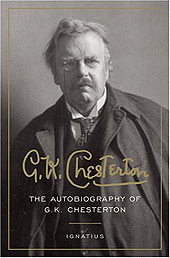 places. To take just one example, pulled at random from The Quotable Fulton Sheen (Image, 1989), about those people who consider themselves "open-minded":
places. To take just one example, pulled at random from The Quotable Fulton Sheen (Image, 1989), about those people who consider themselves "open-minded":
... they are willing to hear all sides, but refuse to accept any. Their minds are so "open" that ideas pass right through. It is to be remembered that the "open mind" is no more important than the open mouth. Unless the mouth shuts on something, the body is never nourished. Unless the mind shuts on truth, it is never at peace.
That appeared originally in Thinking Life Through, published in 1955. Consider, then, this statement by Chesterton, from his Autobiography, about H. G. Wells:
But I think he thought that the object of opening the mind is simply opening the mind. Whereas I am incurably convinced that the object of opening the mind, as of opening the mouth, is to shut it again on something solid.
(A somewhat similar influence can seen in some of the writings of C. S. Lewis, who also gave much credit to Chesterton.) Sheen, in his autobiography, Treasure In Clay (first published in 1980), wrote:
Since my life covered such a long span, it has undergone several influences in style. The greatest influence in writing was G.K. Chesterton, who never used a useless word, who saw the value of a paradox and avoided what was trite. At a later date came the writings of C.S. Lewis, who, with Chesterton and Belloc, became one of the leading apologists of Christianity in the contemporary world ... Malcolm Muggeridge, too, has become another inspiration to me. He is always sparkling, brilliant, explosive, humorous. (p. 83)
On one hand, the influence of Chesterton on Sheen might appear somewhat unexpected, especially since the young Sheen, 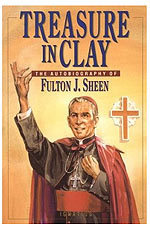 prior to his more popular work (both as an author and preacher) was focused on more academic endeavors, having won the Cardinal Mercier Prize for International Philosophy in 1923 after having earned a doctorate in philosophy at the Catholic University of Leuven in the same year.
prior to his more popular work (both as an author and preacher) was focused on more academic endeavors, having won the Cardinal Mercier Prize for International Philosophy in 1923 after having earned a doctorate in philosophy at the Catholic University of Leuven in the same year.
But just two years later, Chesterton wrote the Introduction to Sheen's first book, God And Intelligence in Modern Philosophy: A Critical Study In The Light Of The Philosophy Of Saint Thomas, a fairly dense work of philosophy that is, as the subtitle indicates, rooted in the thought Aquinas. Chesterton wrote:
The question to which Dr. Sheen here applies the rational as opposed to the irrational method is the most tremendous question in the world ; perhaps the only question in the world, For that reason I prefer to leave its intrinsic consideration to him; and in these few words of introduction to deal with the method rather than the subject matter. The subject matter is the nature of God in so far as it can be apprehended at all by the nature of man. As Dr. Sheen points out, the intellectual purity of the problem itself is much confused nowadays by a sort of sentimental version of the divine dignity of man. As in every other modern matter, the people in question seize on the sentiment without the reason for it. There is nothing particular about the objective anthropoid in a hat that anybody could be actually forced to regard him as a sacred animal; like a sacred cat or a sacred crocodile. This sentiment is a sediment; it is the dregs of our dogma about a divine origin. They begin by bowing down to man as the image of God; and then forget the God and bow down to the graven image. Similarly, as he also points out, the question of yes and no is weakened with all that wearisome discussion about less and more, which has been made fashionable ever since the old fuss about Evolution. It is the view that Being is Becoming; or that God does not exist yet, but may be said to be living in hopes. The blasphemy is not ours. It is enough for us that our enemies have retreated from the territory of reason, on which they once claimed so many victories; and have fallen back upon the borderlands of myth and mysticism, like so many other barbarians with whom civilization is at war.
The two men, of course, shared many loves and interests: first, a great love and devotion to Christ and his Church, as well as an enjoyment of paradox, a desire to defend and convey Church teaching to both the baptized and the pagans, and a great gift for expression and explanation that appealed to ordinary readers without being the least bit shallow or condescending. And, as the quote above indicates, they also shared an abiding adherence to metaphysical realism, philosophical rigor grounded in the Thomistic tradition, authentic reason, orthodox dogma, and traditional civilization.
• Books and Films by or about Abp. Fulton Sheen availble from Ignatius Press
• Ignatius Insight Author Page for G. K. Chesterton
"Shakespeare or not Shakespeare, this is (or seems to be) the problem..."
From The Telegraph, reports that William Shakespeare may have been Shakespeare and, in an added bonus, may have been a Catholic:
L'Osservatore Romano, a week after proclaiming Tintin a Catholic hero, said the Bard's plays "teem with open references to the Catholic religion."
The newspaper reopened a debate which has raged ever since an Anglican archdeacon said of Shakespeare a few decades after his death: "He died a Papist."
In a lengthy article which appeared alongside a review of the new Shakespeare film, 'Anonymous', L'Osservatore Romano (The Roman Observer) said the references to purgatory in Hamlet and other plays betrayed distinctly Catholic beliefs and marked Shakespeare out as a crypto-Catholic.
The newly released film, which explores the theory that Shakespeare's plays were in fact written by Edward de Vere, the Earl of Oxford, stars Rhys Ifans as the aristocrat and Vanessa Redgrave and Joely Richardson as the older and younger Queen Elizabeth I.
"Shakespeare or not Shakespeare, this is (or seems to be) the problem," wrote L'Osservatore Romano, which has the backing of the Vatican. "His identity may be open to discussion but not his faith." It quoted Rowan Williams, the Archbishop of Canterbury, who during a discussion at the Hay Festival in May said he thought Shakespeare was "probably" a Catholic.
Joseph Pearce, who has written a thing or two about Shakespeare and Catholicism, reacts at the Ink Desk blog to the L'Osservatore Romano article, as does Kevin O'Brien, who writes regularly on the same blog.
UPDATE: I see that Mark Brumley has also posted on this story, over on the Catholic World Report blog.
Also see:
• Joseph Pearce calls the movie, "Anonymous", an "act of defamation against the Bard himself" (Nov. 8, 2011)
• Fr. Joseph Fessio and Joseph Pearce discuss, "Who really was William Shakespeare?" (Oct. 28, 2011)
• A "Bard's-eye" View | The Preface and Prologue to Through Shakespeare's Eyes: Seeing the Catholic Presence in the Plays | Joseph Pearce
• Finding Shakespeare and Reclaiming the Classics | Joseph Pearce
• Will the Real Shakespeare Please Stand Up? | The opening chapter of The Quest for Shakespeare
• Fr. Joseph Fessio and Joseph Pearce Talk About Shakespeare | A video interview (Sept. 8, 2008)
• The Quest for Shakespeare website (includes a PDF version of this excerpt from The Quest for Shakespeare)
"'The Face of God' reads like a detective story."
"Florentius" of the Gloria Romanorum blog was initially unable to finish reading Paul Badde's book, The Face of God: The Rediscovery Of The True Face of Jesus. But then:
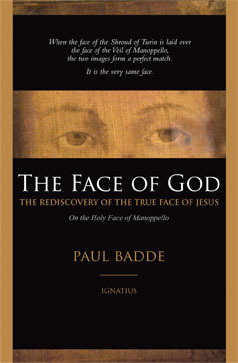
Then, about a year later, I got a note from a Carmelite friend who had read the finished book and loved it. She had even gone so far as to repeat the experiments Sr. Blandina had carried out, comparing the face on the cloth in Manoppello to that the Shroud of Turin. The book, she said, had convinced her of Badde's thesis--that the cloth in Manoppello was actually the Veronica. With this endorsement on board, I took up the book again and quickly read it from beginning to end. I am glad that I did. Once you get past the occasionally awkward translation from the German, The Face of God reads like a detective story. While not completely convincing, Badde's evidence is compelling enough to force the reader to contemplate the Holy Face anew. Indeed, it was apparently convincing enough for Pope Benedict XVI to make a pilgrimage to visit the Holy Face in 2006. ...
In short, this is an engrossing read.
Read the entire post.
Learn more about The Face of God by visiting the book's website.
November 21, 2011
Servants of the Lord: A look at the permanent diaconate in the U.S.

Servants of the Lord: A look at the permanent diaconate in the United States | Jeff Ziegler | Catholic World Report
In his discussion of the Scythians' gruesome royal burial customs, Herodotus spoke of the tragic fate of the king's diakonos, his servant, his waiting-man, his attendant. When the Jews of Alexandria translated the Book of Esther into Greek, they used the same word to describe "the king's servants who attended him." It was natural, then, that when the Apostles ordained "seven men of good repute, full of the Spirit and of wisdom" (Acts 6:3) to serve at the tables of the quarreling Hebrew and Hellenist widows, these men should be called diakonoi, or deacons.
Service at tables led to service at the altar, so much so that bishops from the western Roman Empire, gathered at a synod in Arles in 314, noted with displeasure that deacons "in many places" were usurping the honor due to priests and even attempting to offer Mass. In the Early Middle Ages, an important Spanish Church document stated that "to the deacons it belongs to assist the priest and to serve in all that is done in the sacraments of Christ, in baptism, in the chrism, in the paten and chalice, to bring the oblations to the altar and to arrange them, to lay the table of the Lord and to drape it, to carry the cross, to declaim the Gospel and the Epistle.… To him also pertains the office of prayers and the recital of the names."
Over the course of the first millennium, the diaconate ceased to be a permanent order in the Church's hierarchy in the West while remaining a transitional one preceding priestly ordination—though as late as the 13th century, St. Francis was ordained a deacon without ever being ordained a priest. In explaining the varying missions of the episcopate, the priesthood, and the diaconate, the fathers of the Second Vatican Council expressed the hope that "the diaconate can in the future be restored as a proper and permanent rank of the hierarchy" in the Latin rites, especially in mission territories.
In 1967, Pope Paul VI issued general norms for the restoration of the permanent diaconate where requested by episcopal conferences. More than four decades later, 46 percent of the Church's 37,203 permanent deacons serve in the United States, according to figures published in the 2011 Catholic Almanac, while an additional 5 percent serve in other parts of North America. A third of the Church's deacons minister in Europe, 13 percent in South America, and approximately 1 percent each in Africa, Asia, and Oceania. There are more permanent deacons in the Archdiocese of Chicago than in all of Africa and Asia combined.
Michael O'Brien discusses...
... his new novel, The Father's Tale: A Novel, on "Inside the Pages" at the DiscerningHearts.com site.
Gifts and Rights
Gifts and Rights | Fr. James V. Schall, S.J. | November 21, 2011
"The family model of the logic of love, of free giving and a reciprocal gift should be extended to a universal dimension. Commutative justice—'giving in order to acquire'—and distributive justice—'giving through duty' are not sufficient to build up society. In order for true justice to exist it is necessary to add free gifting and solidarity."
— Pope Benedict XVI, to Centesimus Annus Conference, October 15, 2011
I.
In a brief talk on the fiftieth anniversary of the German charitable foundation, Adveniat, Benedict XVI remarked: "In the Lord's Prayer, Christ teaches us to pray for the coming of the Kingdom. We cannot simply crate it because it is above all a gift." In Plato's shortest dialogue, the Clitophon, Socrates is chided because he is able to move souls by his speeches of how things ought to be, but he seems unable to bring those things about. Socrates, however, is not fooled by the import of this criticism. He knows that it is not easy to reform man, especially if man does not reform his own soul first. Moreover, we may not be able to supply to ourselves everything we need for our highest end. We are by nature not just natural beings but supernatural ones, as Aquinas tells us.
Behind the claim that we can do everything by ourselves, there is something haughty, something critical of the gods. If they could, should they not simply give us everything we need, especially what is most important for us? But if the Kingdom of God is a gift, it cannot come to us directly as a result of our own enterprise. As we read the epistles and gospels of the Masses at the end of any year, we are always reminded that Christ will come as a "thief" in the night, that we know not the day or hour. Christ will come when He wills, not when we demand or expect.
Yet, we live in a "rights" oriented culture. Our discourse, even our religious social discourse, is dominated by the concept of "rights." This word in modern philosophy has a very specific meaning. It is often claimed in Catholic literature that "rights" refer to that which is "owed" to human beings as such. Yet, the term really comes from Hobbes. It means that each of us has a "right" to whatever we will. If we give up this "right" to the state or society, the word does not change its meaning. It means that whatever the organization "wills" is "right." Try as we may, this latter meaning will still be present no matter what we think the word means.
What does a "rights" oriented world culture imply? If I have a "right" to everything I need for my happiness, however we define it, it follows that someone owes us what we do not have. We are made to be not giving but receiving beings. If we do not have what we "have a right to," it follows that someone else is at fault. We are victims. We demand our "rights." Again, "rights" are whatever we want. Society is to be designed to give everyone what he wants, no matter what it is. We are unable to say that anything we or anyone else "wants" is "wrong." It is only something different. We must organize things so everyone gets something of what he wants.
As a result of this mentality, no one can really "do" anything for anyone. If I lack something, someone else owes it to me. When I finally get it, I have no reason to thank anyone, for I only received what was "due" to me. As a result, a "rights" world leaves us with a profound sense of isolation. If we do not have anything, whether it be material or spiritual, it is not our fault, but it is our "right" to have it. This situation gives governments enormous powers and ethical justification. They conceive it their duty to provide for everyone's rights, whatever they are. "Charity" becomes politicized. And even the donations and sacrifices whereby the poor receive from or are taken from for the poor, the "taking" action, whether it be by taxation or confiscation, is conceived as a "right." The rich and enterprising really had nothing to give. Their product was by definition a "social product." And those who "created" wealth were not working for themselves. Whatever they produced was seen as a wealth to be redistributed in the name of someone's "right" to have whatever he lacked.
Such often unperceived dangers of the notion of "rights" bring us to the question of gifts. Christianity is a "gift" oriented revelation, though its representatives are constantly using the word "rights" in a way that has little relation to the manner in which the word is understood in the culture. A "rights-oriented" mentality would maintain that man had everything he needed for human purposes. The Promethean tradition of man's bravery in stealing fire from the gods is still with us. Aristotle's advice that we should not listen to those who tell us that, being mortal, we should only listen to mortal things strikes us as odd, even un-comprehensive. Yet it lies at the very origin of our culture, including Christian culture.
Yves Simon, in many of his works, spoke of the fact there is in man not only a need to have things but also, at a higher level, a need to give. If we prevent the capacity to give, we cease being human. One of the very reasons for the existence of private property is that it allows us to give freely what is ours. If, in giving, the receiver thought he had a "right" to what was given anyhow, we would not only cease giving, but cease giving thanks. And the act of giving thanks is almost the most profound thing about us.
We have all received gifts that we did not "need." And yet, if we examine the phenomenon of gift-giving, we see that the gift given is not primarily what a gift is about. Certainly, we give little gifts to neighbors or colleagues that do not mean much. Yet, the smallest gift is often the best we have. The famous widow in the New Testament is praised not for the value of her gift, but because it represented all she had. She gave of herself. The gift, at its highest meaning, is our human effort to love one another, to give of ourselves to those willing we hope to receive it.
In his talk to the Centesimos Annus congress, Benedict used the phrase "free giving." He even cites the phrase of John Paul II of a "law of 'free giving,'" which of its very nature would be something beyond "law," in the strict sense. A "law" of giving would be like a "law" of friendship, something that cannot be a law. Of course, we can use the phrase "law" of giving or charity or friendship in the sense of describing its nature intellectually. In such a description, the notion of free giving would have to appear. Friendship is a "reciprocal" willing to the other of what is good for him, not us, even though it is also our good. If it is "our good" that dominates such a relationship, by its own "law," it is not really friendship. And yet we cannot will not to want friends or not to give them something.
Nor can we be friends or even human if we do not have a capacity to receive gifts. In a real sense, in spite of St. Paul's insistene that it is better to give than to receive, the capacity to receive graciously is a better sign of our humanity than our capacity to give. Simon points out that we are different from God in this, that God creates the objects of His love. We do not do this; we find them already created. Hence our primary relation to reality itself is that of receivers. And in revelation we are "receivers" of grace, of the Word, of life itself.
Benedict points out that marriage is itself based on "free giving." Thus, it is also based on "free receiving." One could not conceive of a marriage in which there is only "giving." Benedict tells us that "the family is the first place where one learns that the right approach in the social context and also in the world of work, economics and business, must be guided by caritas, in the logic of 'free giving,' giving, of solidarity, and of responsibility for each other." "Free giving" is, presumably, opposed to "forced giving."
This awareness explains why justice and charity are different yet related. Sometimes it seems that all we ever hear about is justice. This feeling is logical in a rights-oriented world. People are ever talking about what is "owed" to them, not what they can give. But it is also true that we need something to give. This need, as I said earlier, is not just a material thing. Indeed, the greatest need we have is that someone love us, from our beginning. We cannot know what love is unless we are first loved. That relationship is the very heart of the Christian revelation. We are what we are because we have received what we are. It is true that we are not automata. The primary result of our experience of being loved is to love in return, freely.
Benedict cites John Paul II who also used the term "free giving" in Centesimus Annus. "This 'free giving' takes the form of heartfelt acceptance, encounter and dialogue, disinterested availability, generous service, and deep solidarity" (#43). In the family, we are not seen as an "object." We are human subjects who see each other's faces. Likewise in Caritas in veritate, Benedict stressed "the family model of the logic of love, of free giving and of reciprocal gift." Indeed, he foresaw this model as capable of universal extension, though it would require some thinking lest this extension end up in an ideology of universal "rights" that approved of anything on the grounds of charity or love.
It is of interest that Benedict specifically distinguishes charity from the two classic forms of justice. Commutative justice returns to the individual what is owed to him. We "give in order to acquire," as the Pope puts it. Distributive justice is based on duty. I give because it is my obligation to others. The pope insists there is yet another notion, that of "free giving." This can be service, love, money, intelligence, anything. And it is not "due." It arises out of what we see in others. We do not just love them to "help" them, or to make them "right." We do so because of the good we see in them. We are bound together by more than needs. We are bound also by truth
In Caritas in veritate, as Benedict recalls, he observed that "the market of gratuitousness does not exist, and attitudes of graciousness cannot be established by law. Yet both the market and politics need individuals who are open to reciprocal gift" (38). Aristotle has already said that the polity needs friendships more than it needs justice. The legislators should be concerned about this even though they should not be so foolish as to impose it. This latter was the danger we saw in the French Revolution and in most socialist movements where everyone was called "brother". The Holy Father added that "Christians are duty bound to report evils, to witness to and to keep alive the value on which the person's dignity is founded." When we think of how much agony the Church and society has recently undergone because "evils" were not reported, we can better appreciate what the Pope had in mind.
But we must add that probably our greatest problem is—to go back to the "rights" question—the will that makes "rights" whatever we want, so there is no "reporting" of evils necessary, except the "evil" of not acknowledging all evils to be "human rights." This is why Benedict says that our love, ultimately, must be "truth-filled." It is not true that we have a "right" to everything or a "duty" to give everyone what they "want." What is true is that we are, each of us, gifts of God in our very being. We are the beings who first discover what and that we are by first being loved, by receiving our very being. Our response to this gift is not primarily what we have a "right" to, but what we can "freely give" in return for a gift of which none of us is worthy.
 Fr. James V. Schall, S.J., is Professor of Political Philosophy at Georgetown University.
Fr. James V. Schall, S.J., is Professor of Political Philosophy at Georgetown University.
He is the author of numerous books on social issues, spirituality, culture, and literature including Another Sort of Learning, Idylls and Rambles, A Student's Guide to Liberal Learning, The Life of the Mind (ISI, 2006), The Sum Total of Human Happiness (St. Augustine's Press, 2007), The Regensburg Lecture (St. Augustine's Press, 2007), and The Mind That Is Catholic: Philosophical and Political Essays (CUA, 2008). His most recent book from Ignatius Press is The Order of Things(Ignatius Press, 2007).
His new book, The Modern Age, is available from St. Augustine's Press. Read more of his essays on his website.
November 19, 2011
Jesus Christ, Shepherd and King
A Scriptural Reflection on the Readings for The Solemnity of Our Lord Jesus Christ the King | Carl E. Olson
Readings:
• Ez 34:11-12, 15-17
• Ps 23:1-2, 2-3, 5-6
• 1 Cor 15:20-26, 28
• Mt 25:31-46
The young man walks down a long but gentle slope into the setting sun. Trailing behind him is a large flock of animals, white and black. When he reaches the valley floor, he turns and faces them. As each animal approaches him, he taps it on the side of the head with his staff. The white sheep steadily make their way off to the right, while the black goats, far more frisky, go off to the left. But the goats, despite being more energetic, will need to be kept warm during the night; the sheep will be kept in the open air, which they prefer.
This routine has been followed in many parts of the Middle East for thousands of years, just one aspect of a way of life mentioned numerous times in Scripture. There are hundreds of references in throughout the Old and New Testaments to sheep, goats, and shepherds. Today's reading from the prophet Ezekiel is an example of how the work of shepherding was employed to reveal truths about the relationship between God and the chosen people. It also appeals to an ancient connection between the Shepherd and the King, a relationship rooted in David and brought to fulfillment in Jesus Christ.
Ezekiel writes of God as the Shepherd who tends his sheep, seeks those that are scattered and lost, and provides food and rest for his flock. All of these images were taken up by Jesus in various discourse and parables (cf., Matt. 18:12-13; Lk 15:3-10: Jn 10). But in addition to care and protection, there is the reality of possible separation and judgment: "I will judge between one sheep and another, between rams and goats." And a few verses later this judgment is connected to the promise of a new David:
"I will save my flock, they shall no longer be a prey; and I will judge between sheep and sheep. And I will set up over them one shepherd, my servant David, and he shall feed them: he shall feed them and be their shepherd" (Ez 34:22-23).
It is Jesus Christ, of course, who is this new shepherd. And, like David, he is also a king. But, unlike David, his kingship is perfect and extends over all men and nations. Matthew's Gospel highlights this fact by having pagans announce, even unwittingly, the kingship of Jesus, as when the magi ask for the baby "born king of the Jews" (Matt 2:2), when Pilate asks Jesus, "Are you the King of the Jews?" (Matt. 27:11), and when a sign is placed above the Crucified Lord stating, "This is Jesus the King of the Jews" (Matt. 27:37). But at the end of time the stunning reality of this kingship will be revealed for all to see: "When the Son of Man comes in his glory, and all the angels with him, he will sit upon his glorious throne…"—the throne of David (Lk. 1:32).
Pope Pius XI, in his encyclical (Quas primas, December 1925) establishing the Feast of Christ the King, stated the feast should remind nations, rulers, and princes that they "are bound to give public honor and obedience to Christ." He told Catholics that Christ is to reign in our minds, wills, hearts, and bodies, so that those who are outside the fold will seek entrance due to our witness, while we who are within "the household of the faith, may bear that yoke, not as a burden but with joy, with love, with devotion; that having lived our lives in accordance with the laws of God's kingdom…" (par. 33).
The parable of the sheep and the goats is not simply about being good or avoiding sin. We are not called to be just philanthropists, but true children of God. We are called to die to ourselves, to live in Christ, and to be subject, in love and by grace, to the King, so that "God may be all in all."
The Shepherd and King stands before us, staff in hand…
(This "Opening the Word" column originally appeared in the November 23, 2008, edition of Our Sunday Visitor newspaper.)
Carl E. Olson's Blog
- Carl E. Olson's profile
- 20 followers


